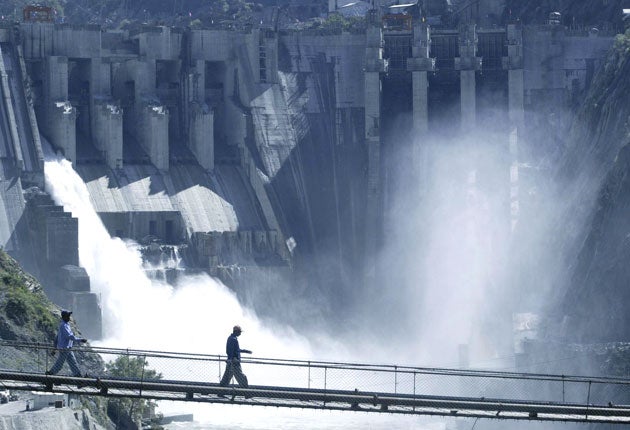India is stealing water of life, says Pakistan
Thousands of Punjab farmers suffer as river Chenab runs dry

Crucial, coveted and increasingly scarce, water has become the latest issue to stoke tensions between India and Pakistan, with farmers in Pakistan's breadbasket accusing Delhi of reducing one of the subcontinent's most important rivers to little more than a trickle.
A group of more than 20 different UN bodies warned earlier this month that the world may be perilously close to its first water war. "Water is linked to the crises of climate change, energy and food supplies and prices, and troubled financial markets," said the report. "Unless their links with water are addressed and water crises around the world are resolved, these other crises may intensify and local water crises may worsen, converging into a global water crisis and leading to political insecurity and conflict at various levels."
The crisis in the agricultural heartland of Pakistan relates to the Chenab, one of a series of waterways that bisect the Punjab, which means 'five rivers'. The Chenab is fed with glacial meltwaters from the Himalayas and for centuries has provided crucial irrigation for the region. But last summer farmers began to notice the levels of both the river and groundwater begin to fall.
Pakistan blames India, saying it is withholding millions of cubic feet of water upstream on the Chenab in Indian-administered Kashmir and storing it in the massive Baglihar dam in order to produce hydro-electricity. Its Indian neighbour, Pakistan declares, is in breach of a 1960 treaty designed to administer water use in the region. After initial talks to try and resolve the issue, the matter has been put on hold since the Mumbai attacks last November in which 165 people were killed, fuelling tensions between the two quarrelsome neighbours.
Pakistan's president Asif Ali Zardari warned: "The water crisis in Pakistan is directly linked to relations with India. Resolution could prevent an environmental catastrophe in South Asia, but failure to do so could fuel the fires of discontent that lead to extremism and terrorism."
The farmers who make their livelihoods along the banks of the Chenab are quick to blame India for their misery. When Mohammed Babar and other villagers close to the town of Wazirabad sunk a well several years ago, they discovered water just 50ft beneath the surface; now the water table lies at around 100ft down. "To irrigate our crops it used to cost about 200 rupees (£2.71) worth of diesel," said Mr Babar, standing amid fields lush with rice and winter wheat. "Now it costs 250 or 300."
From where Mr Babar and his neighbours live, it is just a few hundred yards to the Chenab. Once a strong-flowing river, it is now a slow-flowing trickle. Locals say the river once came up close to the top of the road bridge but now it dribbles past, metres below.
Abdul Hamid and his family make their living cutting reeds for thatching on the east bank of the river. They have watched the level of the water fall, and with it, the supply reeds from which they make their living.
"There has been a big difference. It doesn't even look like a river anymore, it looks like a puddle," said 40-year-old Mr Hamid, who has eight children. "When there is no water, there are no reeds and then no money. My whole family works doing this. We used to earn 500 rupees a day. But now it's down to 300 because there are less reeds." Asked why the Chenab had fallen, Mr Hamid had a ready answer: "It has been cut off by India."
The Chenab is one of five main rivers that pass through the Punjab, all ultimately joining the Indus, which reaches the sea south of Karachi. The 1960 Indus Water Treaty allocated the river waters between Pakistan and India, which is also allowed to make some use of them for power generation. Pakistan complained in 2005 to the World Bankabout the operation of the Baglihar dam. An independent expert upheld some objections, but dismissed others.
Farhatullah Babar, a spokesman for President Zardari, said Pakistan was "paying a high price", but India has denied breaching any conditions of the 1960 treaty. Delhi said it had invited Pakistan's water commissioner to visit the dam to see that the Chenab's flow was naturally low.
India's Ministry of External Affairs declined to comment, but an official said: "The entire peace process and discussions we have been having for the past three or four years have been put on pause. It is not the right climate for these talks when we know that there are threats against our safety and security emanating from Pakistan."
Join our commenting forum
Join thought-provoking conversations, follow other Independent readers and see their replies
Comments